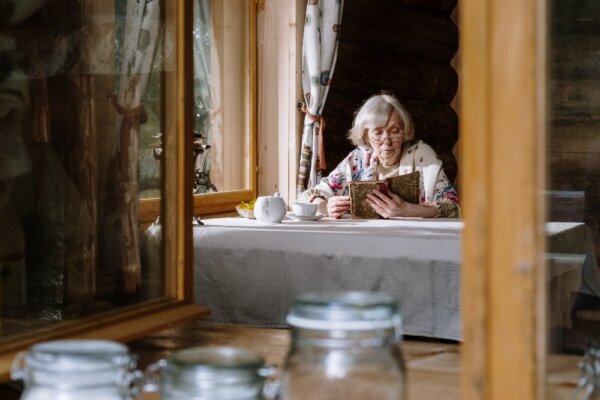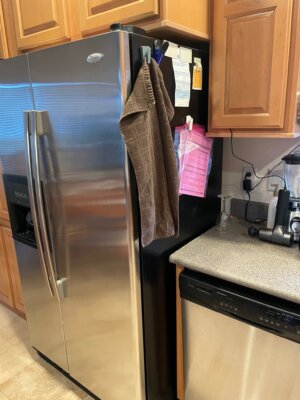
In our retirement community . . .
Everyone is 55 years of age, or older. Some people are a LOT older than 55! Many of our neighbors have special needs, whether they know it or not. After years of working in this environment, we have found that when we’re trying to improve the levels of emergency preparedness for seniors, we encounter some specific senior challenges.
Here are some observations and two action items that you may want to take to heart as we head into the winter months. It’s a time where we are all exposed to more potential dangers — storms, ice and snow, power outages, etc.. Happily, it may also be a time when a heart-to-heart talk with family members is possible and welcome.
Some seniors suffer from complacency.
Some of our neighbors have family close by, with children and grandchildren showing up regularly to celebrate holidays. These families also help mom or dad make decisions and take care of routine chores.
These older folks are lucky to have this support. But they may also get used to handing off responsibility to someone else. In a big emergency, adult children won’t be there! Immediate decisions will have to be made! If people fail to act, results may be disastrous.
So here’s the first question for your family conversation — or for you by yourself if you are a senior:
Question #1: Are you ready to make life-and-death decisions for yourself, by yourself?
Here’s a simple test of how ready you are. Have you taken the time to think through and make decisions about how you want to be treated in case of a medical emergency? I’m referring to completing and/or updating the information in the “Vial of Life.” It’s a vial/bottle/baggie that holds essential medical information for First Responders who arrive when someone calls 911. Emergency preparedness for seniors requires having prepared a Vial of Life!
A second level of personal decision making is to take the next step and complete an Advance Directive and/or POLST form (Physician’s Orders for Life Sustaining Treatment) — and have them ready for medical professionals. These documents go further than the Vial of Life info in that they tell emergency caregivers what level of care you want in specific medial situations. See the P.S. of this Advisory for a photo.
(The POLST form is often confused with a DNR or “Do not resuscitate” order. The DNR may be one of the options on the POLST form, but it’s only one of the options.)
Here in our community we’re remind our neighbors once a year (at least) about completing these important documents. You can get the details here about how we distributed a Vial of Life to all our neighbors a few years ago.
Action item: If you are getting together with family over the next few weeks, get a copy of the Vial of Life information and the Advance Directive for Health Care . Have them ready for discussion. If YOU don’t keep them up to date, in an emergency you may not get the medical care you deserve or want.
Other seniors operate with a sense of entitlement.
Living as we do near a fire station, and in a community where police services are excellent, we get to know our First Responders by first name! We see them frequently, and know they are great folks. Naturally, we expect friendly and competent service to be available all the time.
Our First Responders don’t hesitate to tell us, though, that in a big emergency we will fall off their list so fast our heads will spin!
City government, schools, hospitals, jails, communications centers – all these will be much higher up on the list of priorities than a retirement community. So we regularly ask this question of our neighbors:
Question #2: Have you fallen into the trap of assuming immediate response if you call 911?
When an overwhelming emergency strikes, everyone will be on their own for at least a while. In our training for emergency preparedness for seniors, we encourage neighbors to plan for 10 days of “Sheltering in Place.” If you can take care of yourself, you can survive. You may also even be able to assist others.
And we gently try to remind neighbors: If you can’t take care of yourself, you become a problem for which there is no guaranteed solution.
What about the staff of the community where you live?
In a senior community, unless it is a nursing home or care facility, when an emergency hits there may be NO ONE responsible for individual residents. In fact, in our senior community, the front page of the official Emergency Preparedness Plan states clearly:
” [Community] will not be responsible for the physical evacuation of residents in an emergency. Individual residents shall be responsible themselves. It is each household’s responsibility to be prepared from an emergency or disaster. {Community] will not be responsible to provide food, shelter or medical help.”
Residents can also assume that staff will quickly leave for their own homes to be sure their families are safe!
Of course, we’d like to think that our Neighborhood Emergency Response Group volunteers will be of service. but its members are all seniors in the middle of the same emergency. They will be busy protecting themselves, confirming their own safety and the condition of their homes before they can effectively mobilize to help others.
Action Item: If you live in a senior community, find out what the expectations are for response and care in a widespread emergency. This may be a tricky conversation. But you need to know what to expect. Below are a few questions to ask of your property managers or property owners.
- What do we do when 911 doesn’t respond?
- What about back-up power for medical units or equipment?
- Are there any food supplies that could be tapped for residents in a wide-spread emergency?
- What staff is required to remain on the property in an emergency?
- How will we know what’s going on?
You may find there are really NO GOOD ANSWERS! But it’s best to know that now!
The reality? Seniors are responsible for themselves just like everyone else is!
This entire website is devoted to detailing, step by step, how to prepare for and respond to many different emergencies. Some Advisories are aimed parents with children, some at teenagers, most at able-bodied adults.
This Advisory is specifically aimed at emergency preparedness for seniors (and their adult family members). It deals in large part with attitudes toward preparedness — on the part of the senior and the senior community.
If you know seniors, please share this info and stress the two action items. Neither costs any money — but failure to consider them could add unnecessary stress and potential heartbreak for your family.
Virginia
Your Emergency Plan Guide team

P.S. I want you to know that Joe and I both updated our bright pink POLST forms over the past couple of months. See them hanging on the side of the refrigerator? EMTs will see them immediately!
Don't miss a single Advisory.
Thank you for subscribing.
Something went wrong.
